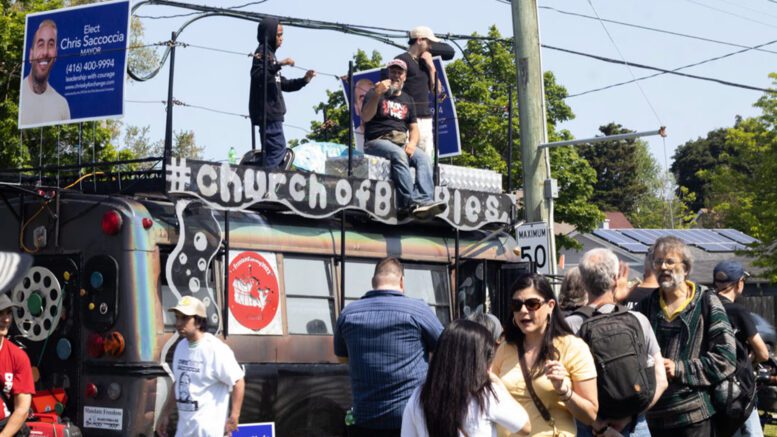Toronto’s mayoral byelection not only broke the record for the number of candidates running, it’s igniting discussions regarding the requisite qualifications needed for candidacy.
Candidates like Meir Straus, 18, the youngest in the race, is running a satirical campaign with promises such as turning “old subway tunnels into a giant lazy river,” while Toby Heaps is the human representative for his seven-year-old pooch, Molly, who would be “Toronto’s first honorary dog.”
Another candidate, Gong Xiao Hua, was forced to forfeit more than $60 million to the New Zealand government as part of a settlement related to a pyramid scheme, according to a 2021 New Zealand Police press release, while another mayoral contender, Christopher Saccoccia, also known as Chris Sky, was recently arrested for allegedly uttering death threats.
Individuals, according to the City of Toronto, can be disqualified from running as a candidate in a mayoral race for being a judge of any court or being an active member of the provincial legislature, House of Commons and Senate. Candidates could also be disqualified for refusing to share financial statements or exceeding spending limits in previous elections or byelections. There are no rules disqualifying candidates from running based on having a criminal history.
According to the City of Toronto website, to be able to run for mayor in this year’s byelection, the candidate has to be: a Canadian citizen over the age of 18; a resident of Toronto or a tenant and owner in the city; and not prohibited from voting. In addition, the individual should not have been disqualified by any “legislation from holding a municipal office.”
To file a nomination as a candidate, individuals are required to have at least 25 endorsements and a pay $200 admin fee accompanied by the nomination form. The City of Toronto media relations team told the Toronto Observer that all election rules, including requirements to become a candidate, are set by the Municipal Elections Act of 1996.
Too many candidates
“I think we do need to consider a rethink of the entry qualification requirements for becoming a candidate. And I imagine that once this election is over, that Toronto city council will turn its attention to that,” said Myer Siemiatycki, emeritus professor in the department of political and administration at the Toronto Metropolitan University.
Siemiatycki said that the number of names on the ballot could confuse voters, and will open more conversations around the requirements for running for city council.
Rethinking requirements
“There’s a balancing act to be finessed when it comes to requirements for being a candidate in an election at any level of government, including municipal,” Siemiatycki said.
He said that the municipal requirements tend to be stricter than the provincial and federal candidate requirements.
He believes that you cannot stop candidates from running for office, but you can “rethink of the entry qualification requirements for becoming for becoming a candidate.”
“I think it would make sense to have a two-stage candidate candidacy process, the first stage is to declare your candidacy. The second is to confirm your candidacy, ” Siemiatycki said.
In the first stage, declaring candidacy, Siemiatycki suggests that individuals should have to collect more than 25 endorsements to file the nomination. The second stage of confirming candidacy would be a chance to see if candidates are getting any traction with their campaigns.
High number of candidates is good for democracy
Siemiatycki and John Beebe, founder of the Democratic Engagement Exchange, both believe we shouldn’t bar candidates with criminal charges or controversial pasts from running.
Beebe believes that although having 102 candidates is too much, the number of candidates is a sign of a healthy democracy, with many showing interest in running.
“The fact that we have a democracy, and these folks have an outlet, and then they don’t get one per cent of the vote, is a very powerful tool for the people to say ‘no,’ to reject that kind of vision very publicly, so that they can’t then put that on some elites or some other force out there saying, ‘Oh, I’m being blocked,'” Beebe said.
Beebe believes although controversial individuals becoming candidates for elections can legitimize their position, people participating in democracy and voting give a “clear signal” when these candidates don’t win.


